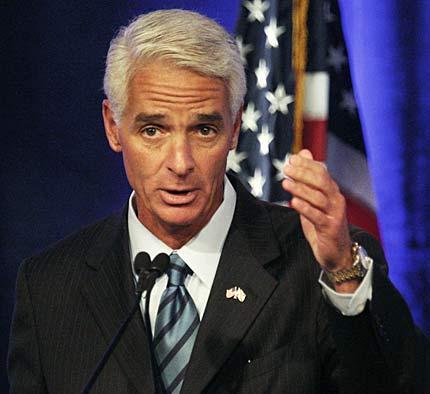Crist goes independent to win Florida Senate race

“People above politics”. This is the headline that greets visitors to Governor Charlie Crist’s campaign site. Crist, the governor of Florida, recently surprised many with his decision last week to leave the Republican Party and run for US Senate as an independent.
In the wake of party switches such as Joseph Lieberman (I-CT) and Arlen Specter (D-Pa), the shock of leaving a party or declaring one's independence simply isn’t what it used to be. A party switch (or exit) can be the product of a number of things, including a disagreement with the party leadership, a feeling that one’s career will be better served in a different party, or in Lieberman’s case, loss of party support in election season.
And yet, up until this point, Crist and Republican Marco Rubio have been the two major contenders vying for Florida's Republican Party nomination. If Crist had changed his political affiliation years earlier or had not made his name as a Republican darling, it would be much easier to explain his conversion as an awakening; however, Crist’s campaign site still describes the governor as a “common-sense conservative who works toward practical solutions for less taxes and increased personal freedom.”
So for now, it appears that Crist is the consummate politician and a genius in political expediency.
Back in early April, a Rasmussen Poll showed then-Republican Crist’s numbers falling steadily compared to those of Republican competitor Marco Rubio (from 34% to 28%). An April 30 poll through the St. Petersburg Times, however, found ‘hypothetical’ Independent Crist leading Rubio 36 to 28. In the poll, Independent Crist also blows Democrat Kendrick Meek clear out of the water, 36 to 23.
Might the Crist camp have commissioned its own similar poll and found such promising results? Perhaps we will never know, but can imagine the answer.
Florida, for the most part, operates a closed primary system, albeit with one caveat. The exception occurs when all the candidates running for a position “have the same party affiliation and the winners will have no opposition in the general election,” and in this case, all “qualified voters, regardless of party affiliation,” can cast their vote in that primary.
According to the Florida Division of Elections, there is a total of 11,071,546 registered voters, and slightly more are registered Democrats than registered Republicans. In March 2010, the state counted 3,974,019 registered members of the Republican Party (36% of the electorate), and 4,621,362 members of the Democratic Party (42% of the electorate).
The Division of Elections also counts 354,529 voters as being registered to a minor party (3%), and 2,121,626 voters (a whopping 19%) as having no party affiliation. By switching to the more ambiguous title of “Independent,” Crist no longer must grapple with the baggage that typically comes with being an avowed Republican or Democrat.
For all intents and purposes, Crist appears to remain a conservative in name, is strong on national defense, a “proven tax cutter,” a strong supporter of the Second Amendment, a candidate who strongly opposes the government-run health care plan, and a governor who “believes strongly in the sanctity of life.”
All of these views put Crist squarely in line with the conservative segment of the Republican Party, and make it even more puzzling that Crist would move from such a base of support, to a more independent status.
And yet, Crist’s record also reflects a flexible politician who does not share all conservative views. Crist supported President Obama’s 2009 $787 billion stimulus package. Interestingly, back in October, the Huffington Post pointed to the toxic effect of Crist’s support for and hug of President Obama, and how such a coupled gesture could act as “an opportunity to win over Democrats, independents and moderate Republicans who voted for Obama.
Understanding the full context and Crist’s obvious ambition to become the next Senator from Florida, his sudden switch suddenly makes quite a bit of sense.




